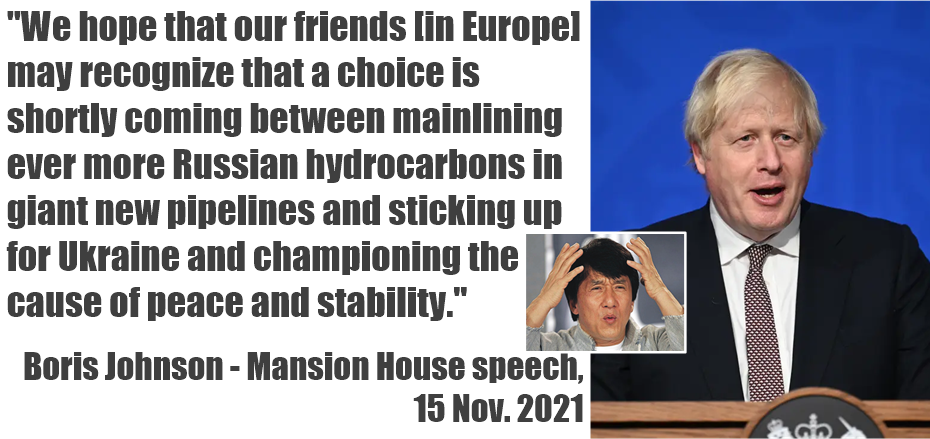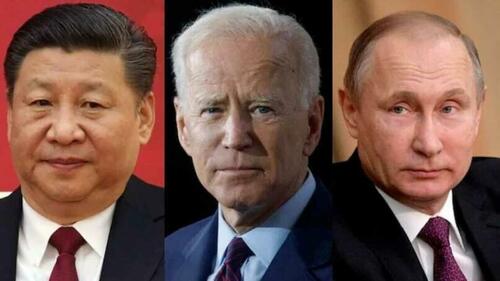wait-n-see
Veteran Member
Runtime - 5:55
Interesting analysis by Peter. Peter does not see it going good for Russia for very solid reasons.
I want to present an alternate idea, if I was the Russian leader instead of starting with a limited nuke exchange, hit the CONUS with a sudden nuclear stealth strike, catch the US leadership off guard. Hit the US so hard, it cannot get up.Very, very believable . . .
which is precisely why people with a vision of this starting with a limited tactical nuclear exchange of some sort are liberals regardless of the smug smile on Hodges face.
Cold war?? What a joke!
This has already gone hot. The only question is how hot it will get and anyone survives at the end.
If he was to go nuke this is the only way to do it. Dont waste the time in the Ukraine or with a single strike to send a message. Send a message by hitting hard and fast. Bases and capital cities, critical infrastructure hubs.I want to present an alternate idea, if I was the Russian leader instead of starting with a limited nuke exchange, hit the CONUS with a sudden nuclear stealth strike, catch the US leadership off guard. Hit the US so hard, it cannot get up.
The stealth strike would involve submarine launched nuclear armed cruise missiles and Club-K nuclear armed cruise missiles.
I am certain with all the illegals crossing the border, some Russian and Chinese special forces came in with them. They mission would be to bring down power lines and cause disruption in the US.
You mean Biden? He doesnt know what he says never mind the meaning of it. If there isnt an X taped on the floor he doesnt know where to stand. He cant string a coherent sentence together. He had to have a cheat note to write a condolence for the Queens death. How many times have his statements been walked back? The fact that he doesnt know what he says scares me worse than Putins drivel.I would say the one that just cleared up some stuff is Joe.
The language of MAD has mostly been forgotten.
Do this, we're okay.
Do that, we're not okay.
Clear, precise communications.
It avoids misunderstandings.
Don't like Joe, but everyone knows where he stands.
China goes after Taiwan, militarily , US defends. Now China knows.
Russia uses tac nukes im Ukraine, US goes after Russia. Now Russia knows.
The white house staffers are just sweet talking the masses.
Message delivered.
Its Cold war 2.
Everyone is clear, everyone gets a better
Chance of seeing tomorrow.
Well, yes, in some circles. But there is certainly a good element of propaganda here for this pecker-pianist actor/comedian. If his regime was not propped up by the US & European nations endless military and monetary support, I don't think he'd be engaging in such photo ops. Personally, I can't stand Zippy, and as for Putin, he is someone to fear, for I don't think this guy bullshits. Putin does not have to have endless photo ops to scare the hell out of the whole world.It's called hands on leadership
The problem with your idea, is that it is very plausible indeed. Given the weak kneed regime we have, by the time any order came out to do anything at all the whole damn place will be smoke, dust and mushroom clouds.I want to present an alternate idea, if I was the Russian leader instead of starting with a limited nuke exchange, hit the CONUS with a sudden nuclear stealth strike, catch the US leadership off guard. Hit the US so hard, it cannot get up.
The stealth strike would involve submarine launched nuclear armed cruise missiles and Club-K nuclear armed cruise missiles.
I am certain with all the illegals crossing the border, some Russian and Chinese special forces came in with them. They mission would be to bring down power lines and cause disruption in the US.
This is what I am actually expecting. Putin has said in the past that his days of living on the streets of -iirc - Leningrad-, taught him that if he knew he was going to end in a fight, that his best chance of surviving was to hit first and hit hard. Their Kanyon torpedo the size of a small submarine is designed to cause a tsunami able to wipe out major cities. That new submarine able to deliver that torpedo was just commissioned. Is our libtard NWO “leadership” in DC and Washington being controlled by the WEF who want us all dead and wiped off the face of the Earth ? Looks to me like they are...I want to present an alternate idea, if I was the Russian leader instead of starting with a limited nuke exchange, hit the CONUS with a sudden nuclear stealth strike, catch the US leadership off guard. Hit the US so hard, it cannot get up.
The stealth strike would involve submarine launched nuclear armed cruise missiles and Club-K nuclear armed cruise missiles.
I am certain with all the illegals crossing the border, some Russian and Chinese special forces came in with them. They mission would be to bring down power lines and cause disruption in the US.




I'd lean toward sinking that aircraft carrier off Taiwan, eliminating Okinawa, and Guam and getting action going in the Pacific.I want to present an alternate idea, if I was the Russian leader instead of starting with a limited nuke exchange, hit the CONUS with a sudden nuclear stealth strike, catch the US leadership off guard. Hit the US so hard, it cannot get up.
The stealth strike would involve submarine launched nuclear armed cruise missiles and Club-K nuclear armed cruise missiles.
I am certain with all the illegals crossing the border, some Russian and Chinese special forces came in with them. They mission would be to bring down power lines and cause disruption in the US.
Liveuamap
@Liveuamap
11m
President @AndrzejDu: This is not a regional conflict: this war - Russia's war against Ukraine - is the source of a global fire, this war will affect both our and your countries. Unless it has already happened https://liveuamap.com/en/2022/20-september-president-andrzejduda-this-is-not-a-regionalvia @prezydentpl
View: https://twitter.com/Liveuamap/status/1572349506397552640?s=20
Doug--since you brought up Sept 24--I hate it when I am correct. It seems the September 24th date has more significance than I first thought. Yom Kippur is on October 4th also.
I would say a nuclear exchange is imminent.
I went to Safeway this afternoon. The sheeple were lined up on the self checkout lines 30 deep, and for several cycles too. And the crazies were absolutely bonkers. I saw a black guy start a fire under a park bench to cook
his lunch.
I said from Day one Putin would never lose. He won't. Nukes will come into play. Oreally, prepare for a nuke exchange. Heck, it is 0200 PST and we could have launches within hours if zippy goes for it.
The ukies will now be uterrly crushed. NATO will be engaged.
IT IS TEOTWA
WKI
I want to present an alternate idea, if I was the Russian leader instead of starting with a limited nuke exchange, hit the CONUS with a sudden nuclear stealth strike, catch the US leadership off guard. Hit the US so hard, it cannot get up.
The stealth strike would involve submarine launched nuclear armed cruise missiles and Club-K nuclear armed cruise missiles.
I am certain with all the illegals crossing the border, some Russian and Chinese special forces came in with them. They mission would be to bring down power lines and cause disruption in the US.
Compared to like Biden losing control of Chicago?

It wasn't the first time Biden answered with a simple "yes" when pressed on whether the US would defend Taiwan if the island were invaded.US and Canadian warships sailed through the Taiwan Strait on Tuesday following weekend remarks from President Joe Biden that the US would defend Taiwan in the event it is attacked by China.
A US Navy ship, the Arleigh Burke-class guided-missile destroyer USS Higgins, conducted a “routine Taiwan Strait transit” on Tuesday, US Navy spokesperson Lt. Mark Langford said in a statement.
The US ship conducted the transit “in cooperation with Royal Canadian Navy Halifax-class frigate HMCS Vancouver,” Langford said.
Um Duduman pretty much said this America will burnThis is what I am actually expecting. Putin has said in the past that his days of living on the streets of -iirc - Leningrad-, taught him that if he knew he was going to end in a fight, that his best chance of surviving was to hit first and hit hard. Their Kanyon torpedo the size of a small submarine is designed to cause a tsunami able to wipe out major cities. That new submarine able to deliver that torpedo was just commissioned. Is our libtard NWO “leadership” in DC and Washington being controlled by the WEF who want us all dead and wiped off the face of the Earth ? Looks to me like they are...
He was speaking at the UN in NYC. Hence the mJust now catching up after a long and stressful day at work. OK--this "map" that "President AndzeiDu" had accompanying his tweet that "this war....is a global fire...that will affect both our and your countries"---this map is OF NEW YORK CITY.
And I never knew that one of its boroughs is called "New BABYLON."

 warnews247.gr
warnews247.gr
Now there’s a novel idea to destroy the USThis is what I am actually expecting. Putin has said in the past that his days of living on the streets of -iirc - Leningrad-, taught him that if he knew he was going to end in a fight, that his best chance of surviving was to hit first and hit hard. Their Kanyon torpedo the size of a small submarine is designed to cause a tsunami able to wipe out major cities. That new submarine able to deliver that torpedo was just commissioned. Is our libtard NWO “leadership” in DC and Washington being controlled by the WEF who want us all dead and wiped off the face of the Earth ? Looks to me like they are...
